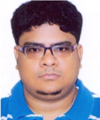| Title | Third Decade of Swarm Intelligence: Looking Beyond Particle Swarms and Ants |
| Speaker | Dr. Swagatam Das |
| Chair | István Erlich |
Abstract
It has been a long time since the coining of the term “Swarm Intelligence (SI)” by Gerardo Beni and Jing Wang in 1989, in the context of cellular robotic systems. In these days SI marks a very prominent paradigm of natural and bio-inspired intelligent computing. An SI system typically consists of simple agents or boids that follow very simple rules, and although there is no centralized control structure dictating how individual agents should behave. Local and to a certain degree random interactions between such agents lead to the emergence of “intelligent” global behaviour, unknown to the individual agents.
Two most prominent families of algorithms within SI that enjoyed a very high degree of attention from the researchers are Particle Swarm Optimizers (PSOs) and Ant algorithms. However, keeping in mind there is no free lunch, lots of new algorithms, closely following the SI principles, have regularly been devised for solving general as well as domain specific optimization problems over the past one decade or so. How some of the well-known and modern SI algorithms connect or differ from PSO or ant colony based techniques? Do the former class really offer some advantage in context to intelligent computing? How do they compare on a class of common and standard benchmark problems? This lecture is a humble attempt to answer some of these questions.
In particular the lecture will focus on the foundations, perspectives, and comparative behaviour of algorithms like the Bacterial Foraging Optimization (BFO), the Invasive Weed Optimization (IWO), The Artificial Bee Colony (ABC) algorithm, the Gravitational Search Algorithm (GSA), the Group Search Optimization (GSO) algorithm, and the Cuckoo Search algorithm. Instead of only describing each of the algorithms in details, the talk will be more focused on finding the common and conflicting features of the algorithms, their hybridization perspectives and their comparative performances on standard set of benchmark problems. Relative advantage and downsides of the algorithms will be highlighted in context to their search performances and individual needs for parameter tuning.
Biography
 Swagatam Das is serving as an assistant professor at the Electronics and Communication Sciences Unit of Indian Statistical Institute, Kolkata. His research interests include swarm intelligence and evolutionary computing, pattern recognition, multi-agent systems, and wireless communication. Dr. Das has published one research monograph, one edited volume, and more than 150 research articles in peer-reviewed journals and international conferences. He is the founding co-editor-in-chief of “Swarm and Evolutionary Computation”, an international journal from Elsevier. He serves as associate editors of the IEEE Trans. on Systems, Man, and Cybernetics: Systems and Information Sciences (Elsevier). He is an editorial board member of Progress in Artificial Intelligence (Springer), Mathematical Problems in Engineering, International Journal of Artificial Intelligence and Soft Computing, and International Journal of Adaptive and Autonomous Communication Systems. He has acted as guest editors for special issues in journals like IEEE Transactions on Evolutionary Computation and IEEE Transactions on SMC, Part C. Dr. Das has been acting as a regular reviewer for journals like Pattern Recognition, IEEE Transactions on Evolutionary Computation, IEEE/ACM Transactions on Computational Biology and Bioinformatics, IEEE Transactions on SMC Part A, Part B, and Part C. He has been associated with the international program committees and organizing committees of several regular international conferences including IEEE CEC, IEEE SSCI, SEAL, GECCO, and SEMCCO. He is a senior member of IEEE and the recipient of the 2012 Young Engineer award from the Indian National Academy of Engineering (INAE).
Swagatam Das is serving as an assistant professor at the Electronics and Communication Sciences Unit of Indian Statistical Institute, Kolkata. His research interests include swarm intelligence and evolutionary computing, pattern recognition, multi-agent systems, and wireless communication. Dr. Das has published one research monograph, one edited volume, and more than 150 research articles in peer-reviewed journals and international conferences. He is the founding co-editor-in-chief of “Swarm and Evolutionary Computation”, an international journal from Elsevier. He serves as associate editors of the IEEE Trans. on Systems, Man, and Cybernetics: Systems and Information Sciences (Elsevier). He is an editorial board member of Progress in Artificial Intelligence (Springer), Mathematical Problems in Engineering, International Journal of Artificial Intelligence and Soft Computing, and International Journal of Adaptive and Autonomous Communication Systems. He has acted as guest editors for special issues in journals like IEEE Transactions on Evolutionary Computation and IEEE Transactions on SMC, Part C. Dr. Das has been acting as a regular reviewer for journals like Pattern Recognition, IEEE Transactions on Evolutionary Computation, IEEE/ACM Transactions on Computational Biology and Bioinformatics, IEEE Transactions on SMC Part A, Part B, and Part C. He has been associated with the international program committees and organizing committees of several regular international conferences including IEEE CEC, IEEE SSCI, SEAL, GECCO, and SEMCCO. He is a senior member of IEEE and the recipient of the 2012 Young Engineer award from the Indian National Academy of Engineering (INAE).
URL of the speaker: http://www.isical.ac.in/~swagatam.das/
